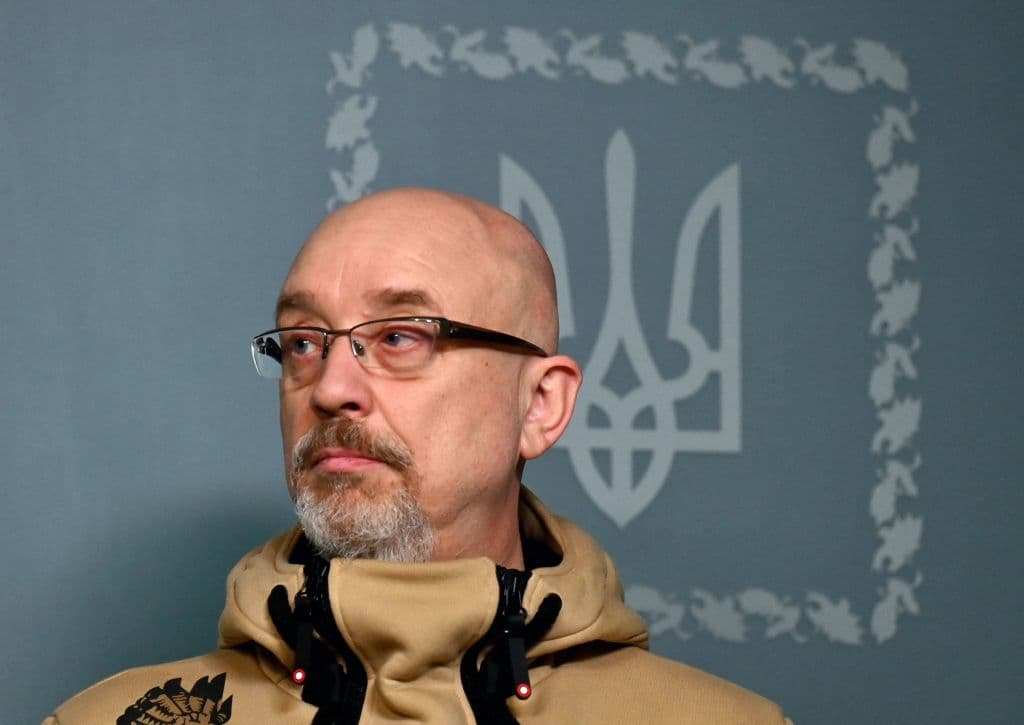Ukraine war latest: Russia may be behind letter bomb attacks in Spain, Reznikov says

Key developments on Dec. 1:
- Spanish police investigates six letter bombs sent to political and military targets possibly related to supporting Ukraine in Russia’s war.
- 50 Ukrainian soldiers return home in new prisoner exchange with Russia.
- Switzerland freezes nearly $8 billion in Russian assets under EU sanctions.
- General Staff: Russian forces launch 16 airstrikes on targets in Ukraine.
Defense Minister Oleksii Reznikov said on Dec. 1 he believes that Russia could be behind a series of recent letter bomb attacks in Spain.
The first letter bomb was discovered on Nov. 30 after it was sent to the Ukrainian Embassy in Madrid. One of the employees received minor injuries while inspecting it, according to Foreign Ministry spokesperson Oleh Nikolenko.
Other bombs were sent to the Spanish Defense Ministry, the U.S. Embassy, the Torrejon de Ardoz air base, which provides intelligence information to Ukraine's Armed Forces, and the headquarters of Spanish weapons manufacturer Instalaza, which produces rocket launchers supplied to Ukraine.
On Dec. 1, law enforcement revealed that Spanish Prime Minister Pedro Sanchez received a similar explosive on Nov. 24.
According to the country's authorities, all six envelopes contained similar, homemade substances.
Local media reported that officials are investigating whether the incidents are linked to the Russian invasion of Ukraine.
"The world is beginning to recognize that (Russia) is a terrorist state. And terror knows no borders," Reznikov said. "They use terrorist means to cause terror."
Foreign Minister Dmytro Kuleba said that on the day when the envelope with a bomb was sent to the Ukrainian Embassy in Madrid, two more Ukrainian diplomatic missions received letters with "very specific threats." However, he refused to specify diplomatic institutions in what countries were threatened.
Prisoner exchange
President's Office Head Andrii Yermak reported on Dec. 1 that Russia had released 50 Ukrainian prisoners of war under the recent prisoner exchange.
Among those who returned home were soldiers who fought in Mariupol and other cities in Ukraine's east. Some of the released soldiers were injured, according to the official.
"We will work until we free every Ukrainian," Yermak said on Telegram.
The Russian Defense Ministry said in a statement that it also received 50 people back as part of the prisoner swap.
The previous prisoner exchange took place on Nov. 26, during which 12 Ukrainian citizens, including three civilians, were released.
Between mid-March and November, Ukraine returned more than 1,130 prisoners of war, according to the Coordination Headquarters for Treatment of Prisoners.
The largest exchange took place on Sept. 21, when 215 prisoners of war, including Mariupol defenders, were returned from Russian captivity.
According to Deputy Prime Minister Iryna Vereshchuk, 2,500 Ukrainian prisoners of war were in Russian captivity as of late September.
Read more: What it’s like to know your loved ones are in Russian captivity.
Russia's frozen assets
Switzerland has frozen financial assets worth nearly $8 billion as a response to Russia's invasion of Ukraine, the State Secretariat for Economic Affairs (SECO) said on Dec. 1. Fifteen Russian properties have also been blocked as of Nov. 25, according to the agency.
According to SECO, the agency overseeing sanctions, Swiss banks hold deposits of Russian nationals, natural persons, and legal entities amounting to about $48.15 billion (46.1 billion francs), which is far less than the $213 billion estimated by the Swiss Bankers Association in March.
The reason for this inconsistency could be that Russians who are also Swiss or EU citizens or have a residence there are not subjected to the ban on deposits, SECO wrote.
The agency added that Russians' bank deposits of less than 100,000 francs are also exempt from the sanctions.
The EU has frozen Russian assets worth 68 billion euros in response to the Russian invasion of Ukraine as of late November. Confiscating the assets is more difficult because relevant legislation and court decisions would be required for that.
Most of the assets are in Belgium, which accounts for 50 billion euros out of the total EU figure. Luxembourg ranks second with 5.5 billion euros. Together with Italy, Germany, Ireland, Austria, and France, they constitute over 90% of frozen Russian assets in the EU, according to Politico media outlet.
On Nov. 10, the U.K. government reported it had frozen assets owned by Russian oligarchs, other individuals, and entities sanctioned for Moscow's full-scale invasion of Ukraine, which together account for $20.5 billion.
Attacks and casualties
On Dec. 1, Russian forces launched missile attacks on the positions of Ukrainian troops in Kharkiv Oblast, carried out 16 airstrikes, some of them targeting the settlement of Bilohiria in Zaporizhzhia Oblast, and shelled the liberated southern city of Kherson with multiple rocket launchers, the General Staff of Ukraine's Armed Forces reported.
The same day, Ukraine's private energy company DTEK said Russian troops had struck its facilities, wounding two employees. Over the past two months, DTEK enterprises were attacked by Russian forces 16 times, according to the company.
Moscow has been targeting Ukraine's critical infrastructure since early October, admitting that the country's energy facilities are its primary goal.
Over the past day, Russia's military attacked seven Ukrainian oblasts, according to the local governor's data.
Sumy Oblast Governor Dmytro Zhyvytskyi reported that Russian troops shelled and mined the region 110 times along the Russian-Ukrainian border. The attacks killed a 15-year-old boy and damaged a hospital, residential houses, a kindergarten, cars, and electricity and gas networks.
In the northeastern Kharkiv Oblast, Russian troops shelled Kharkiv's Kupianskyi district, damaging residential houses and warehouses. Russian troops also attacked the communities of Vovchansk and Lyptsi near the border, damaging homes, the oblast’s governor Oleh Syniehubov reported.
Overnight on Dec. 1, Russian forces struck the Nikopolskyi district in Dnipropetrovsk Oblast eight times, damaging residential houses and commercial buildings, a gas pipeline, and a power line, said Dnipropetrovsk Oblast Governor Valentyn Reznichenko. No casualties were reported.
The liberated southern city of Kherson came under fire on the morning of Dec. 1, Kherson Oblast Governor Yaroslav Yanushevych said. The attack resulted in blackouts across the city.
According to Yanushevych, the local energy company Khersonoblenergo is working on fixing the problem.
Watch our latest video on how Kherson residents were living under Russian occupation.










